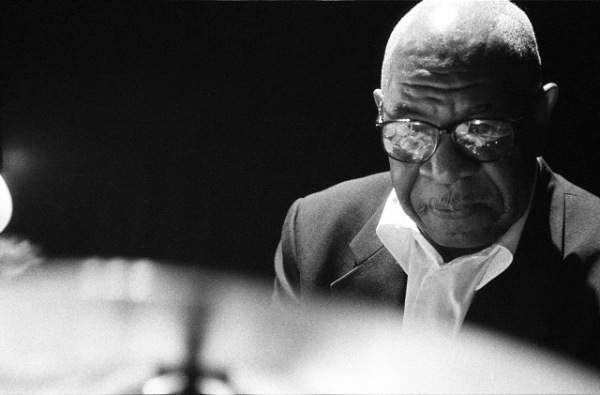BY BILL HANGLEY JR. The 20th century took another blow today with the passing of a Philly jazz giant, Mickey Roker. A master of the drums and a mentor to generations, Roker was a link to an age when people paid big bucks in Tokyo or Hamburg to see what any Philloid could still see for free.
His death was reported today by Temple Univerity’s WRTI, which will be featuring his music all day; no cause of death has been announced so far. He was 84.
Roker was both a global ambassador and a local institution. Like countless others I first heard him holding down the groove in Ortlieb’s Jazz Haus, during the years when the traditional Philly jazz bar was already an endangered species, and Ortlieb’s was a lonely outpost in a gap-toothed neighborhood whose next boom was still decades away. As a player, he was the epitome of classy, tuneful swing, and as a Philadelphian, he was a standard-bearer for the open-hearted spirit that represents the best of our town; much of what I know of the highest purpose of music I learned watching him and his peers welcome my young friends to the bandstand to share and carry on the legacy of the music they loved.
“When he asked for me to be on the first gig I did with him I felt like my dreams had come true,” wrote local tenor player Victor North on hearing of Roker’s passing. “And then, that contagious, inclusive laugh of his. I miss him already.” North’s Facebook page is full of similar sentiments from other players, harbingers of the tide of testimonials yet to come: “A treasure.” “One of a kind.” “Amazing talent and yet so humble.”
Born in Florida in 1932, Roker landed in Philly at 10, part of the great migration of African Americans from the segregated South to the violent and heartless North. The city’s lively jazz scene “kept me out of prison,” Roker once said. “Philadelphia was so gang-infested at the time, and the drums kept me in the house practicing.”
Mentored by a jazz-loving uncle just four years his senior, learning at the feet of stalwarts like Philly Joe Jones and Jimmy Heath, his resume would eventually include a laundry list of the one-name greats: Dizzy, Sonny, Ella, Herbie, Milt, Wes. Self-taught, self-made, he was blessed with an effortless swing that once inspired Gillespie to say: “Once he sets a groove, whatever it is, you can go to Paris and come back and it’s right there.”
And if his path found him backing everything from gutbucket blues to the highbrow interpretations of the Modern Jazz Quartet, one spirit animated it all: “If you can’t have any fun, man, I don’t want to be there.”
That was always obvious at Ortlieb’s. Also obvious was the fact that like all great drummers, he didn’t just play the beat; he didn’t even just play the song. He could open up a song, and bring it, living and breathing, to anyone who was ready feel it; he had that generosity of spirit you find in people who know that while scenes come and go, the power of music is eternal, and universal.
As he put it after winning a 2008 award for mentorship from Intercultural Family Services:
“Lemme tell you, I feel like I died and went to heaven tonight … it’s a beautiful thing when you’re involved with children. I remember when I was a child, the first time I heard the drums, it frightened me! See, my people come from Nassau, and we lived in a project in Miami, Florida. And every New Years, when 12 o’clock come, the children who parade would come around, and they would have on these uniforms, and playing the drums, and when I was about four years old … scared me to death! All this calypso rhythm.
So the next year I was waiting for ’em! …. And I followed them. I got up out of my bed and followed them … and the drums been a part of my life ever since.
And music – even before I had drums, we used to sit around the radio and sing. Sing with the songs, that’s how I learned songs. And it helped me later on, when I really got into playing the drums I knew all the songs! I tell all the drummers: learn melody. If you learn melody it’s so much easier for you to add rhythm. And everybody has a certain rhythm. It’s like the spices in your food – you can tell where you’re from by the rhythm you’ve got. You know? HA HA HA HA!”
RIP, Mickey.

